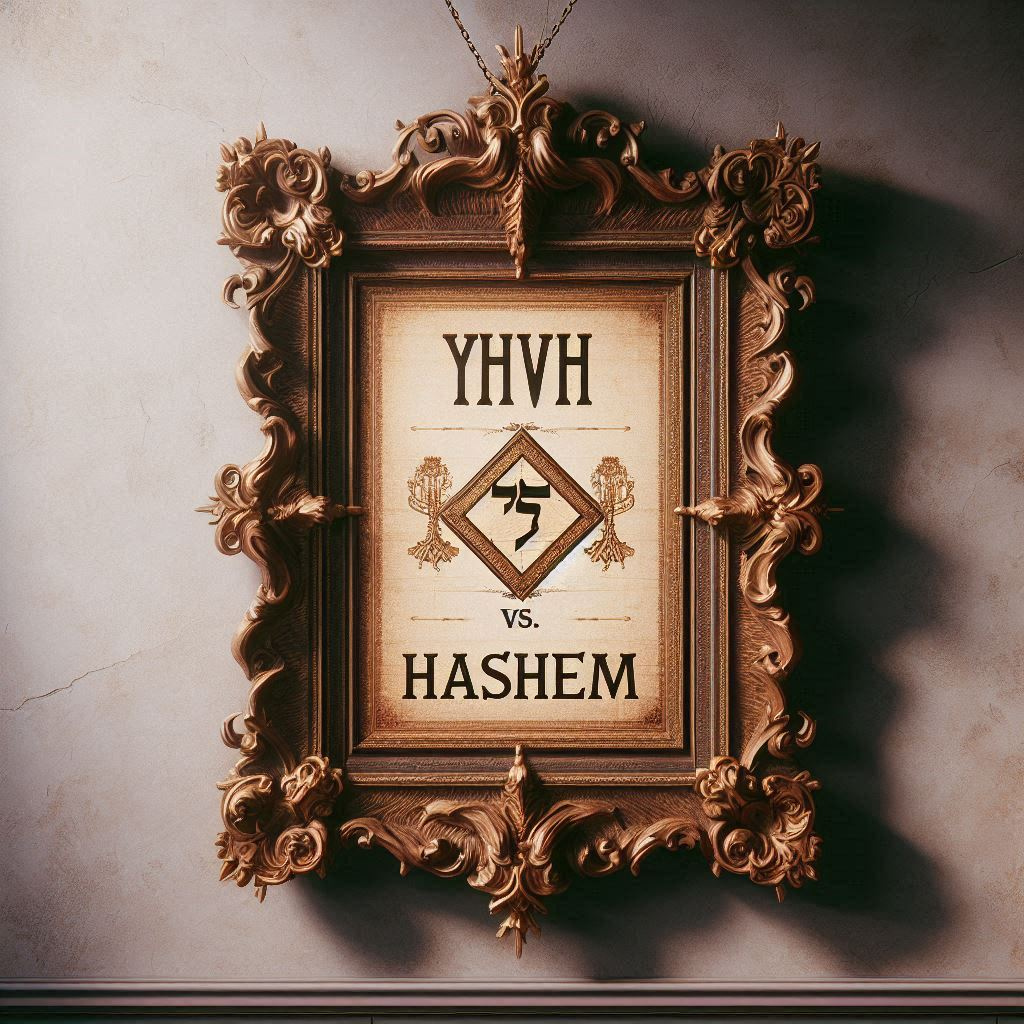The Ineffable Name Controversy: Breaking Traditions and Unveiling Truth
Introduction: In the realm of faith, the Name of Yehovah holds profound significance. However, the tradition of not uttering or writing this sacred name has sparked controversy and debate. This blog post delves into the origins, interpretations, and implications of this practice, shedding light on the true essence of the Ineffable Name.
The Tradition of Writing “G-d”: Many Jewish communities avoid writing the full name of God, opting for “G-d” instead. This practice stems from a passage in Deuteronomy, which commands the Israelites to destroy the names of non-Israelite gods. Rabbinic interpretations extended this to mean that God’s name should not be erased, leading to the tradition of writing “G-d”1.
Rabbinic Interpretations and Misinterpretations: Rabbinic authorities, such as Rashi, interpreted the prohibition against erasing God’s name as a reason to avoid writing it altogether. This led to the practice of storing or burying Jewish literature containing the name “God” once it fell into disrepair2. However, this interpretation has been contested, as the original scriptural intent was to prevent the worship of Yehovah in the manner of pagan gods3.
The True Name of Yehovah: The Father revealed His eternal and holy name to Moses, declaring it to be remembered for all generations (Exodus 3:15). Despite this, Rabbinic authorities replaced the name Yehovah with titles and descriptors like “Adonai” and “Elohim,” effectively nullifying the Torah’s instructions regarding the use of God’s name4.
The Impact of Rabbinic Regulations: By enacting regulations against using God’s name, Rabbinic authorities transgressed Yah’s eternal Torah. This has led to a widespread practice of substituting God’s name with titles, which often have pagan origins5. This practice contradicts the scriptural mandate to declare and magnify Yehovah’s name throughout the earth6.
Conclusion: As Torah-observant disciples, it is our duty to honor and proclaim the true name of Yehovah. By doing so, we fulfill the scriptural command to declare His name to all generations. Let us break free from traditions that obscure the true essence of God’s name and embrace the profound significance of Yehovah.
For those of you who would like to explore this week’s Torah Reading 13, I invite you to read and listen to the discussion entitled “Yehovah: the God Who Sees.” (Yehovah-The God Who Sees-STAR 13)
Overturning Roe v. Wade and the Modern Messianic-Thoughts and Reflections
A Leak That is Shaking up Nation On M-nday, 5/2/2022, The Epoch Times reported that a supposedly leaked U.S. Supreme Court document suggests that the Judicial Branch of this country may finally overturn controversial Roe V. Wade. News of this leak rocked the...
God Humbles Those Who He Enters into Covenant With
This is an overview of the 30th Reading of our 3-year Torah Reading Cycle. It is found in Genesis/Beresheit 31:3-32:2. I use the Hebrew names of the patriarchs throughout this post. And just to familiarize you with the names so as to not cause any confusion:...
The Exceeding Kingdom Qualifying Righteousness That Takes us from Passover to Tabernacles-Part 1
The Exceeding Kingdom Qualifying Righteousness That Takes Us from Passover to Tabernacles-Part 1 One of the many things about Passover (aka Pesach) and the Days of Unleavened Bread (aka Chag HaMatzah) that we must be mindful of as we progress through the...
Keeping Passover by Way of the Renewed Covenant-Part 3 of Keeping Passover and Unleavened Bread in 2022
This is the third and final installment to our “Keeping Passover and Unleavened Bread in 2022” discussions. This installment is entitled “Keeping Passover by Way of the Renewed Covenant-In Spirit and in Truth.” If by chance you did not read or listen to...
Keeping Passover by Way of the Original Covenant-Part 2 of Keeping Passover and Unleavened Bread in 2022
This is “Keeping Passover and Unleavened Bread in 2022.” This will be part two (2) of a three (3) part discussion on Passover and the Feast of Unleavened Bread or Chag HaMatzah, which I’ve elected to entitle this particular discussion: “Keeping Passover by Way of the...
Some Passover Basics-Keeping Passover and Unleavened Bread in 2022-Part 1
This is “Some Passover Basics.” It is the first installment of a three (3) part series I chose to entitle: “Keeping Passover and Unleavened Bread in 2022.” We have a lot to cover. So let’s get right into it. For those of us who keep the Observational...
Shabbat HaGadol–The Pathway Towards our Redemption and Atonement-STAR-28
This is Shabbat HaGadol: The Pathway Towards our Redemption and Atonement. In observing Jewish circles, this Sabbath is referred to and celebrated as “Shabbat HaGadol.” Otherwise referred to as the great Sabbath, Shabbat HaGadol is traditionally held on...
Guarding the Month of Aviv-Aviv’s Critical Importance to God’s Covenant Elect
Opening Remarks "Observe the month of Abib, and keep the Passover unto Yehovah thy Elohim; for in the month of Abib Yehovah thy Elohim brought thee forth out of Egypt by night" (Deu./Devarim 16:1; ASV modified). Which brings me to the title of this discussion...
Birthrights-Blessings-Covenant Promises: Lessons Learned from the Story of Esau and Jacob-Part 2-STAR-26
This is Birthrights, Blessings, Covenant Promises-Lessons Learned from the Story of Esau and Jacob, Part 2. This will be the 26th Torah Reading or Parshah of the 3-year Torah Reading Cycle. Our reading is found in Genesis or Beresheit 27:30-38:9. Having...
Birthrights-Blessings-Covenant Promises-Lessons Learned from the Story of Esau and Jacob-Part 1-STAR-26
This is Birthrights, Blessings, Covenant Promises-Lessons Learned from the Story of Esau and Jacob, Part 1. This will be the 26th Torah Reading or Parshah of the 3-year Torah Reading Cycle. Our reading is found in Genesis or Beresheit 27:30-38:9. As in...

